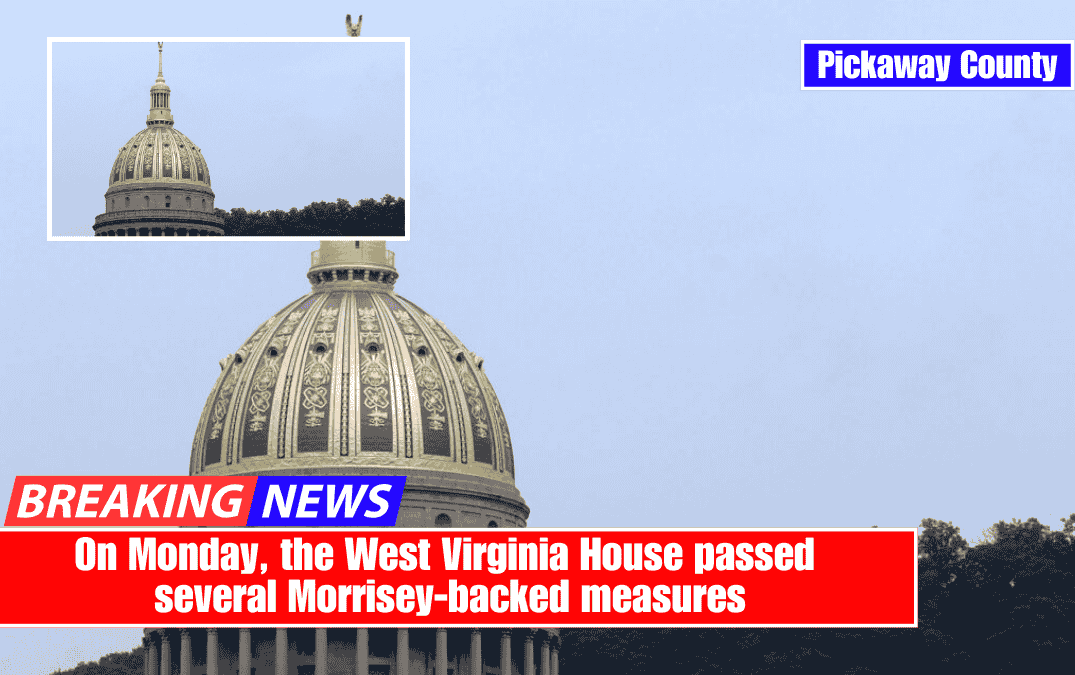RAINELLE, WV (Reuters) – The phone rang above the whine of Trey Yates’ butter churn. The caller was polite, but the message was devastating: Mountaineer Food Bank was terminating Yates’ butter contract due to federal government funding cuts.
The next day, President Donald Trump signed a proclamation commemorating National Agriculture Day, praising farmers and food producers such as Yates. However, the canceled contract with the federally funded food bank, one of only two in West Virginia, had provided a lifeline for Yates’ business.
Yates, 27, didn’t know how much longer he could hold on. He called his father, John Yates, with his heart pounding, shocked that Trump’s administration would act in this manner.
“Dad, they’re trying to bankrupt me,” he told me. Yates, a registered independent, stated that he did not vote for Trump.
Along West Virginia’s winding back roads and Appalachian hollers, where Trump received 70% of the vote in November, his administration’s pledge to reduce government spending is being felt strongly.
Yates’ lost sales are the result of the U.S. Department of Agriculture’s cancellation of the Local Food Purchase Assistance Cooperative Agreement Program, which was set to provide approximately $500 million to food banks this year.
Trump’s administration also reduced other federal funding, which has kept small agriculture businesses like Yates’ Greenbrier Dairy running.
Natasha Zoe, an orchard owner and retired Marine, is waiting for grant funds to reimburse her for the construction of a small cannery near Alderson that will allow fruit farmers to make and sell syrup and juice.
And funds that helped food banks and schools purchase farmer Johnny Spangler’s blueberries and popcorn in Lindside have been reduced after he increased plantings and purchased a larger truck to meet demand.
For decades, Washington has pumped money into rural America through an intricate web of economic support, ranging from USDA and Department of Commerce grants to Small Business Administration funding.
Much of it has since been frozen, reduced, or eliminated, including at least $1.5 billion in USDA funding for schools and food banks.
“The federal government is the engine of money, while the states are the distributors of money,” said James L. Perry, an emeritus professor at Indiana University who studies federal grants. “This has become more pronounced as the federal budget has grown.”
According to Perry, the cuts have forced states to find funding from their own budgets or shut down programs entirely. States such as West Virginia, which rely on federal funds for more than half of its $19.2 billion annual budget in fiscal 2025, are particularly hard hit.
PASS-THROUGH IN THE PAST
The practice of the United States government granting land or money to state and local governments dates back over 200 years, as a means of encouraging action deemed to be in the national interest. These pass-through grants exploded in the 1960s under President Lyndon B. Johnson, whose domestic agenda sought to remake America by eradicating poverty, resulting in significantly increased funding for education, housing, and food access.
Pass-through funding now allows federal agencies to benefit from local expertise and knowledge while also allowing the federal government to reduce its own staffing levels, according to Colleen Heflin, a professor of public administration and international affairs at Syracuse University.
According to a USAFacts analysis of data from the Office of Management and Budget and the Treasury Department, the United States spent approximately $1.1 trillion on pass-through grants to state and local governments in fiscal 2024, accounting for roughly 16% of total federal spending.
During his presidential campaign, Trump repeatedly pledged to reduce government waste and spending while also stating his support for American farmers.
“He will ensure farmers have the support they need to feed the world,” Anna Kelly, White House deputy press secretary, told Reuters.
The USDA is reviewing all programs for which payments have been placed on hold, and Agriculture Secretary Brooke Rollins is working to make decisions as soon as possible, according to an agency spokesperson.
Pass-throughs are an especially effective approach in agriculture, according to Heflin. The Patrick Leahy Farm to School Grant Program and the Local Food Purchase Assistance Cooperative Agreement Program (LFPA), both of which were eliminated, required that funds be spent on purchases made within the state or a certain radius of the delivery location.
The White House stated that the LFPA, which began in 2021, was a Covid-era program that was being phased out.
According to the most recent data available from the United States Census Bureau, federal funds account for roughly one-third of state annual spending.
In addition to the cuts, a massive government spending bill passed on March 15 resulted in West Virginia organizations not receiving nearly $109 million in funds requested by the state’s congressional delegation, according to Kelly Allen, executive director of the West Virginia Center for Budget and Policy. This included $500,000 for youth nutrition in the state capital, Charleston.
The cuts are expected to have a greater impact on the southern part of the state, where Yates lives and works, due to its higher concentration of low-income residents, according to Allen.
BRIDGING THE GENERATIONS
Trey Yates comes from a four-generation agricultural family. His butter and cheese feed hungry schoolchildren and the poor in an area where a decent paycheck is as scarce as rain in a summer drought.
His great-grandfather, grandfather, and father all worked in or owned dairies. His father also worked in a local food processing plant, bottling vinegar and apple butter. Sometimes John would bring Trey, who would watch as the jars rolled off the line and were delivered to grocery stores.
Yates helped to bridge the generation gap. Butter-making began first, in fits and starts. Tapping into schools and food banks made sense because they are two of the state’s largest food markets.
Feeding children also came from a place of memory. His mother, Stephanie, prepared an extra lunch for friends who did not have a parent or food at home. Church ladies brought boxes of peanut butter and jelly sandwiches to the school for the football team.
“Everyone got a sandwich,” Yates explained. “Some needed more.”
On a recent spring morning, Yates’ delivery route led him back to the same lunchroom. Swinging the cafeteria door open at Meadow Bridge Regional School, the aroma of freshly baked rolls, made with Yates’ butter, filled the air.
Despite losing the contract with Mountaineer Food Bank, Yates’ sales to Fayette County Schools are currently secure: Andrew Pense, the director of school nutrition, said he had other funds to purchase Yates’ butter.
But steady orders from one school district are insufficient to keep Yates afloat. Some of his other school customers have told him that they can stretch their budgets through the school year, but purchases for summer food programs and beyond may be at risk.
BILLS STACKING UP
Even before Trump took office, Yates’ bills were piling up. In 2016, his parents pledged their home to the bank to help him purchase the two-story building that would become a small creamery, complete with a butter churn and milk pasteurizer.
He owes money to Mike Fogus, a dairy farmer aged 68. Fogus agreed in 2014, when Yates was only 17, to sell every drop of his cows’ milk to the young man if he fulfilled his dream of starting a creamery. He liked the idea of assisting his friend’s son, who got his start in the 4-H youth development program by showing Maybelle the Jersey cow at summer fairs.
Fogus let Yates’ cows graze on his pastures and be milked alongside his own herd. It was also supposed to benefit the older dairyman, whose business was too small to profitably sell his milk to larger processors. However, as Yates struggled, a chill crept in between the two men.
“You gonna get me that check?” Fogus inquired of Yates, who had recently driven onto the farm for a milk pickup. Yates nodded. As the truck bounced back up the muddy road, Fogus noticed Yates’ cows, collateral on the hoof.
Yates said he has $10,000 in delinquent invoices from schools that have yet to pay for butter deliveries. Approximately one-third of his school customers have reduced their regular orders.
“I am going to pay him back,” Yates stated. “The bank, Mike, everyone is going to get paid. If I have to liquidate everything, everyone will get paid.”
‘THEY AIN’T COMIN’
Yates isn’t the only one who is angry. On March 15, he walked through the Beckley-Raleigh County Convention Center in Beckley, where afternoon sunlight cast shadows on the polished floor.
Volunteers at this town hall, hosted by local Democratic county officials, distributed US Constitution booklets and cookies. Organizers said they sent certified letters inviting U.S. Senators Shelley Moore Capito and Jim Justice, as well as U.S. Representatives Carol Miller and Riley Moore, to the event, but none showed up.
A spokeswoman for Sen. Capito, who oversees federal funding for schools and food banks, told Reuters that he did not receive an official invitation to the event. Her office stated that staff are communicating directly with several constituents.
Representative Moore declined to comment. Rep. Miller and Sen. Justice did not return requests for comment.
There were Republican, independent, and Democratic voters there. As a soundman fiddled with the microphone at the front of the room, someone in the back exclaimed, “They ain’t comin’, are they?”
A volunteer shook his head, “No.” Instead, for two hours, people addressed images of their government representatives. Some people cried. Others yelled. Hunger came up repeatedly.
Yates crouched over his knees, frowning and cracking his knuckles. He stood up and approached the microphone. He later admitted that he didn’t have any notes.
“They are taking fresh, local foods out of our kids’ mouths and those facing hunger,” Yates told the crowd. “I’d never been political until now. If they need a new face of agriculture in this state, they dug me out of the woods.”
A loud and deep cheer erupted, filled with a mix of desperation and hope.















